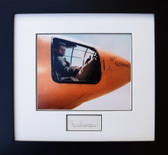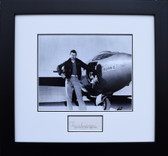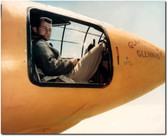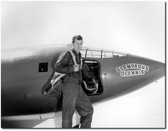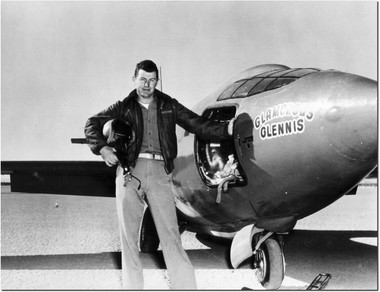 Loading... Please wait...
Loading... Please wait...- Home
- Aviation Gifts Under $50
- Unframed - Aviation Photos
- Chuck Yeager w/ the Bell X-1
Categories
Chuck Yeager w/ the Bell X-1
Product Description
CHUCK YEAGER WITH THE BELL X-1
Dimensions: 8" x 10"
Plane Type: Bell X-1
Charles Elwood "Chuck" Yeager Born February 13, 1923 is a former United States Air Force officer and record-setting test pilot. In 1947, he became the first pilot confirmed to have exceeded the speed of sound in level flight.
Yeager's career began in World War II as a private in the United States Army Air Forces. After serving as an aircraft mechanic, in September 1942 he entered enlisted pilot training and upon graduation was promoted to the rank of flight officer (the World War II USAAF equivalent to warrant officer) and became a P-51 fighter pilot.
After the war, Yeager became a test pilot of many types of aircraft, including experimental rocket-powered aircraft. As the first human to officially break the sound barrier, on October 14, 1947, he flew the experimental Bell X-1 at Mach 1 at an altitude of 45,000 ft (13,700 m). Although Scott Crossfield was the first to fly faster than Mach 2 in 1953, Yeager shortly thereafter set a new record of Mach 2.44.
Yeager later commanded fighter squadrons and wings in Germany, and in Southeast Asia during the Vietnam War, and in recognition of the outstanding performance ratings of those units he was promoted to brigadier general. Yeager's flying career spans more than 60 years and has taken him to every corner of the globe, including the Soviet Union during the height of the Cold War.
The Bell X-1 that General Yeager flew to break the speed of sound was a rocket engine-powered aircraft, designated originally as the XS-1, and was a joint National Advisory Committee for Aeronautics-U.S. Army Air Forces-U.S. Air Force supersonic research project built by Bell Aircraft. Conceived during 1944 and designed and built in 1945, it achieved a speed of nearly 1,000 miles per hour (1,600 km/h; 870 kn) in 1948. A derivative of this same design, the Bell X-1A, having greater fuel capacity and hence longer rocket burning time, exceeded 1,600 miles per hour (2,600 km/h; 1,400 kn) in 1954.The X-1, piloted by Chuck Yeager, was the first manned airplane to exceed the speed of sound in level flight and was the first of the X-planes, a series of American experimental rocket planes (and non-rocket planes) designated for testing of new technologies and often kept secret.

